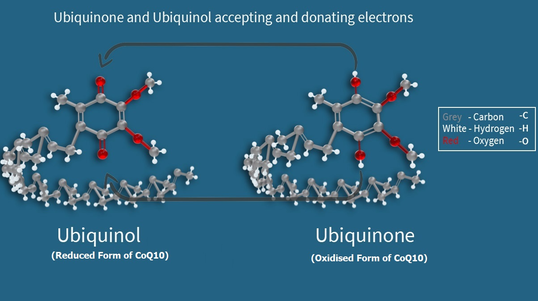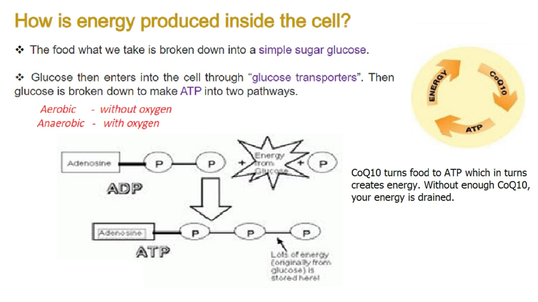The role of Coenzyme Q10 in Hair and Skin
What is Coenzyme Q10 (CoQ10) anyway?
Coenzyme Q10 is a ubiquinone which is found in all cells in the human body. It's an important nutrient in cell metabolism and can be found in the mitochondria of cells (think of them as little battery packs that give our cells energy). Think of ATP as the energy currency used by cells to carry out many biochemical processes needed to sustain life, then CoQ10 is like the energy factories of the cells. When COQ10 levels drop, so does energy levels. Production of CoQ10 by the body decrease with age and this can lead to many of the symptoms we associate with aging: physical and mental fatigue, pain and muscle cramps, weakened immune, neurological diseases, and weight gain. Secondary to weight gain, you also have an increased risk of diabetes, heart disease, and cancer. We simply cannot live without CoQ10. Therefore it’s vital that we make sure our levels of CoQ10 remain high throughout life either by consuming foods high in the nutrient or we supplement it in order to keep us healthy, have strong thick hair or youthful skin. It's not only aging which depletes our CoQ10 levels, but certain types of medications and drugs such as Antidiabetic medications, psychotherapeutic drugs, heart medications (statins).

What's the difference between ubiquinol and ubiquinone?
CoQ10 is not actually quite a vitamin. It's a popular antioxidant nutrient found in the body cell. In your body, CoQ10 shifts back and forth between two states in a continuous cycle: ubiquinone and ubiquinol. Both are true forms of CoQ10 and the terms are often used interchangeably. From a chemistry standpoint, ubiquinol is the reduced form of CoQ10 whereas ubiquinone is the oxidised form. Remember that CoQ10 occurs naturally in the body and it shifts between its ubiquinone and ubiquinol form in a continuous cycle. When you take a ubiquinone supplement, your body converts it to ubiquinol and back again. So regardless of what form of CoQ10 you take, your body will convert it to the other form as needed. As both are interchangeable, there is no significant differences between the two so both ubiquinone and ubiquinol are the de facto standard forms of Coezyme Q10.

How does deficiency of CoQ10 affect hair and skin?
A lack of Coenzyme Q10 can affect the production of ATP because coenzyme Q10 plays an important part in the electron transfer process in aerobic cellular respiration. This is where cellular energy in the form of ATP (adenosine triphosphate) is synthesized. If suitable levels of ATP are not met, the body will use testosterone to produce cellular energy. This results in the production of DHT, which has been proven to cause hormone-related hair loss. Since CoQ10 is so vital in energy metabolism, and hair growth is energy intensive (hair follicles are more complex than you realize), it goes to reason that we need to boost energy levels of the cells to keep hair growth strong, just as it is in our youth. Similarly, CoQ10 helps make energy for your skin cells, which makes your skin cells work better and stay younger. As our levels of CoQ10 are depleted with age they are less able to control free radicals and the body is less able to produce collagen and elastin, which in turn can lead to wrinkled, sallow, and less firm skin.
Role of Coenzyme Q10 in Hair and Skin
In the skincare application, CoQ10 is a very good ingredient to fight anti-aging. The scalp is a huge skin surface so what is applicable on the skin is also applicable on the scalp. In a study published in 2009, researchers looked at the effect of using coenzyme Q10 in shampoo on a group of healthy volunteers who were older than 40 years of age. Throughout the test, they measured gene expression of hair keratins from the hairs they plucked from the volunteer’s heads to see if the shampoo had any effect on genes involved in hair growth. They found that just by using the shampoo enriched with CoQ10, genes involved in hair growth were increased. The hair follicles became more active. It was also found that CoQ10 also protects hair cells against Aminoglycoside. This is hardly surprising given the fact that Coenzyme Q10 is crucial for energy metabolism, and declines with age. On the forum, there are also several stories shared of how CoQ10 had helped improved hair growth.
Why both Adenosine and Coenzyme Q10 makes a great pair in anti-aging?
As we age, dermal levels of ATP decline and creates an energy deficiency, thereby affecting skin appearance. ATP is effective in providing anti-aging protection, as well as skin moisturising and soothing properties. Additionally, ATP is a major molecule for all intracellular processes. There are many anti-aging ingredients such as hyaluronic acid, plant stem cells, peptides, resveratrol, retinol and certain vitamins, but they don't lead to increased level of ATP production directly. Nothing beats better than having natural occurring chemicals that is present in your body. Adenosine boosts ATP production while Coenzyme Q10 facilitates ATP production. Therefore, when paired, Adenosine and Coenzyme Q10 work synergistically to MAXIMISE the ATP production level, which is why we do include both Adenosine and Coenzyme Q10 in our serum formulations. Whether it is for scalp or skin use, you do need good anti aging ingredients in your maintenance regimen.
Get special discounts and offers
Join our newsletter and be the first to know